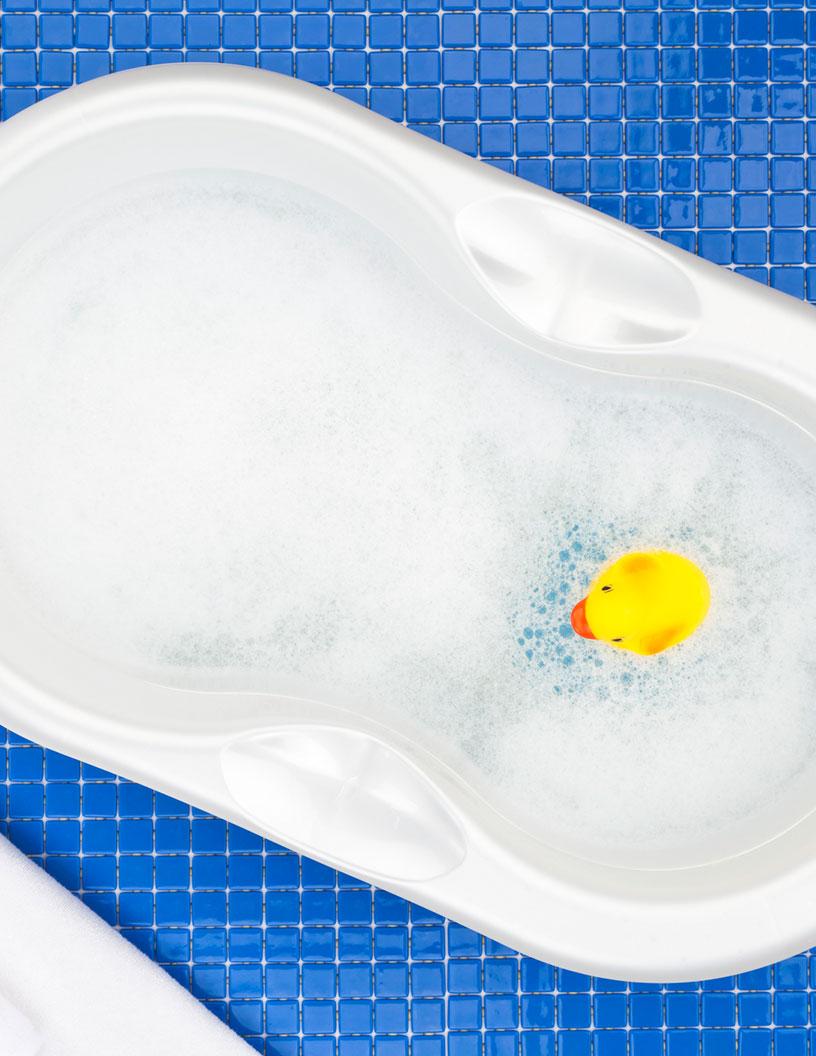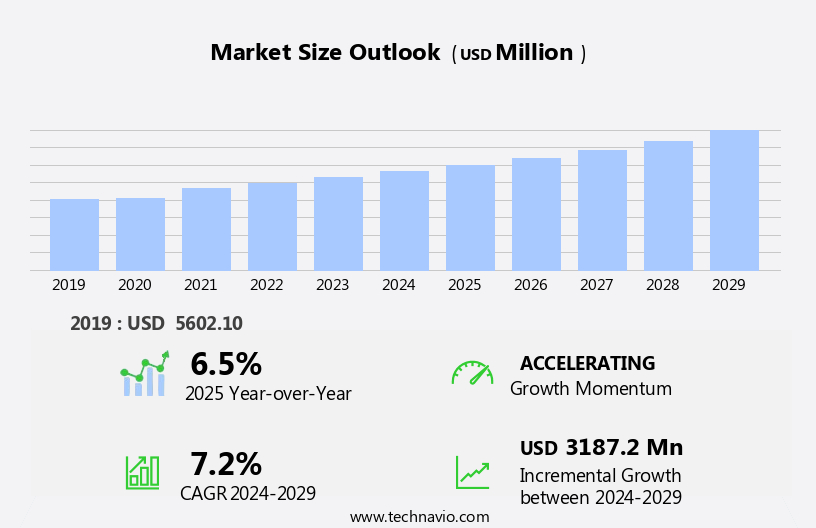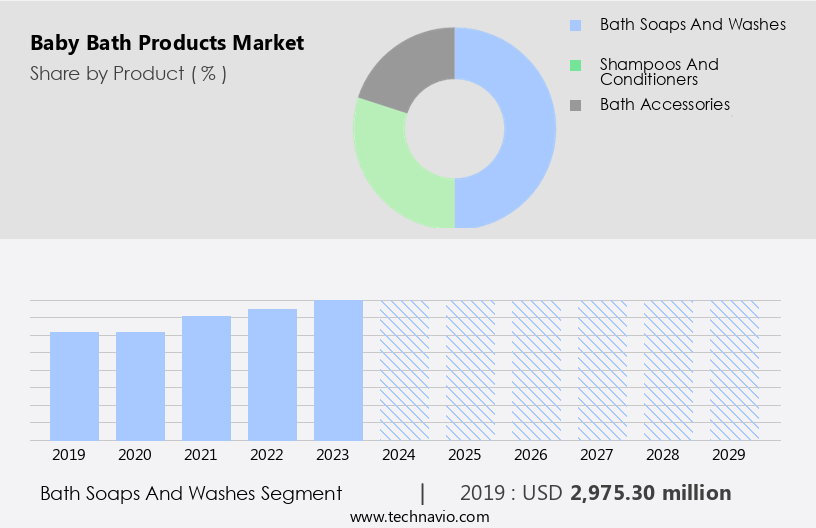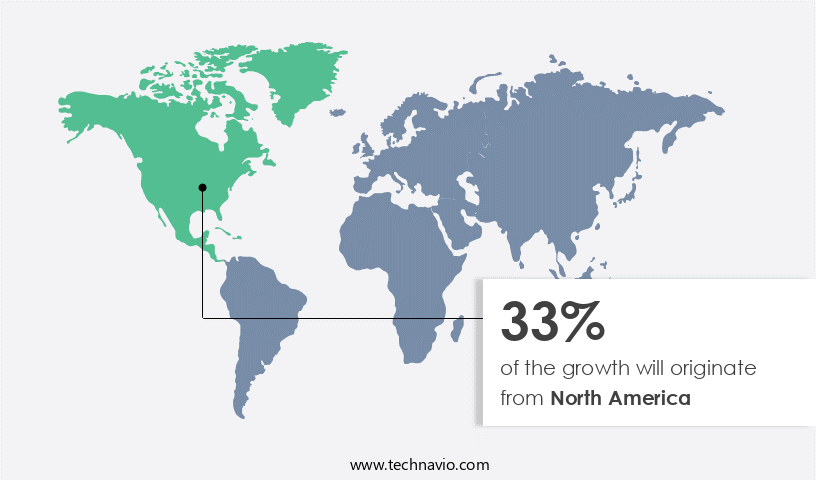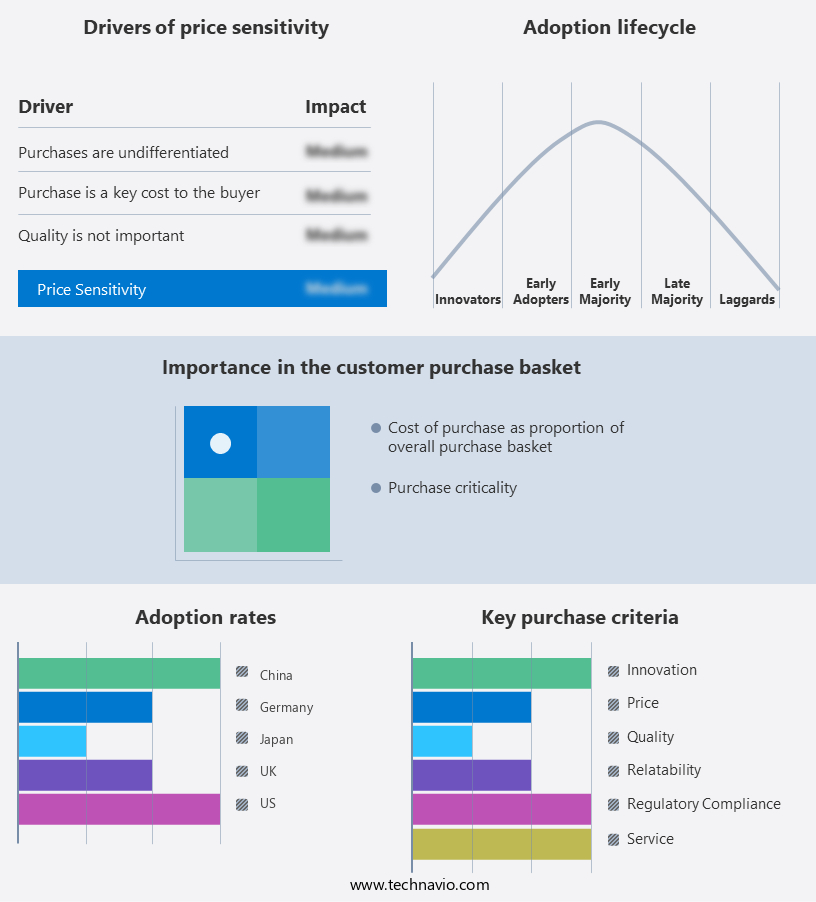Baby Bath Products Market Size 2025-2029
The baby bath products market size is forecast to increase by USD 3.19 billion, at a CAGR of 7.2% between 2024 and 2029.
- The market is witnessing significant growth driven by the trend towards innovation and portfolio extension, leading to product premiumization. Companies are focusing on enhancing their product offerings with advanced features and higher quality materials to cater to the evolving needs of consumers. For instance, the introduction of multifunctional bath products and bath kits, which combine bathtubs, toys, and other accessories, is gaining popularity. However, the market faces a notable challenge due to the global decline in birth rates, which may impact the demand for baby bath products. Simultaneously, initiatives by governments and non-governmental organizations (NGOs) in developing markets about hygiene are fostering increased product penetration. Despite this, opportunities exist for companies to capitalize on the trend towards sustainable and eco-friendly products.
- For example, the increasing awareness of the potential health risks associated with traditional baby bath products containing harsh chemicals is driving demand for natural and organic alternatives. Additionally, the integration of technology into baby bath products, such as smart tubs with temperature control and water level indicators, offers potential for differentiation and added value. Companies can navigate these challenges by focusing on product innovation, sustainability, and catering to the evolving needs and preferences of consumers. These efforts aim to address the needs of growing populations and improve accessibility to essential child care goods.
What will be the Size of the Baby Bath Products Market during the forecast period?
Explore in-depth regional segment analysis with market size data - historical 2019-2023 and forecasts 2025-2029 - in the full report.
Request Free Sample
- In the dynamic baby product market, baby shower gifts continue to be popular purchases for expectant parents. However, as babies grow into toddlers, the focus shifts towards toddler skincare, addressing unique skin conditions and irritations. Understanding baby product psychographics is crucial for brands seeking to innovate and differentiate. Baby product formulation and ingredient transparency are key trends, with certifications like organic and hypoallergenic gaining traction. With the rise of e-commerce platforms and increasing internet penetration, customers have easy access to a wide range of baby care products, including baby body washes, cleansing gels, and moisturizers.
- Baby product testing and revenue growth are ongoing priorities for companies, with a focus on design that addresses baby skin conditions, allergies, hair growth, and hair loss. Infant skincare and baby care products remain staples, with hair products gaining increasing attention. Baby product labeling and distribution networks are also critical components of a successful business strategy. Pricing strategies vary, from premium offerings to budget-friendly options, catering to diverse demographics. Baby product sales are driven by retail channels, both physical and ecommerce, while effective marketing and branding are essential for standing out.
How is this Baby Bath Products Industry segmented?
The baby bath products industry research report provides comprehensive data (region-wise segment analysis), with forecasts and estimates in "USD million" for the period 2025-2029, as well as historical data from 2019-2023 for the following segments.
- Product
- Bath soaps and washes
- Shampoos and conditioners
- Bath accessories
- Distribution Channel
- Offline
- Online
- Formulation
- Conventional
- Natural
- Geography
- North America
- US
- Canada
- Europe
- France
- Germany
- Italy
- UK
- APAC
- China
- India
- Japan
- South Korea
- Rest of World (ROW)
- North America
By Product Insights
The bath soaps and washes segment is estimated to witness significant growth during the forecast period. The Baby Products market encompasses a range of items designed for infant care during bath time. Safety standards are paramount, ensuring baby nail clippers are safe and easy to use, diaper cream shields sensitive skin, and lotions provide gentle cleansing for sensory play. Bath sets offer convenience with pump dispensers, bath toys, and water temperature control. Natural ingredients, clinically tested, are increasingly preferred for baby essentials such as powder, sun protection, hair care, and skincare routine products. Bath soaps, body wash, and bubble washes are popular, with a rise in demand due to brand awareness and the preference for natural and organic options.
Non-medicated bath soaps and washes cater to budget-conscious consumers, while medicated varieties are prescribed for specific skin conditions. Bath accessories, such as bottle design, bath seats, and bath sponges, enhance the bathing experience. Eco-friendly packaging and organic ingredients further appeal to environmentally-conscious parents. Baby massage, skin protection, and hair care routines are essential parts of a baby's overall well-being. Baby combs, skin moisturizers, and gift sets complete the comprehensive range of baby bath products available in the market. Toddler care items, such as bath towels and toddler bath tubs, cater to the evolving needs of growing children.
Product packaging plays a crucial role in attracting consumers and ensuring ease of use. Bath time is a precious moment for bonding and nurturing, and the market continues to innovate to meet the diverse needs of families. This trend is reflected in the increasing popularity of eco-friendly diapers, clothing, and breastfeeding support, such as breast pumps and lactation aids.
The Bath soaps and washes segment was valued at USD 2.98 billion in 2019 and showed a gradual increase during the forecast period.
The Baby Bath Products Market is evolving with increased focus on baby registry products, catering to new parents' needs. Innovations in baby hair products support healthy baby hair growth while minimizing baby hair loss. Strict baby product certifications ensure safety and quality, driving consumer trust. Companies invest in baby product design, baby product branding, and baby product marketing to stand out in a competitive landscape. Efficient baby product distribution across baby product retail and baby product ecommerce platforms boosts accessibility. Market strategies focus on baby product pricing, impacting baby product revenue, while shifting baby product demographics influence demand trends.
Regional Analysis
North America is estimated to contribute 33% to the growth of the global market during the forecast period. Technavio's analysts have elaborately explained the regional trends and drivers that shape the market during the forecast period.
In North America, the US dominates the market, driven by innovation and expanding product portfolios, as well as heightened awareness surrounding infant hygiene. Offline sales, primarily through hypermarkets and supermarkets, remain prevalent. However, the increasing preference for online shopping is boosting the presence of pure-play e-retailers, such as Amazon and eBay, in the distribution landscape, particularly in the US and Canada. Safety standards are paramount in the production of baby bath products, ensuring gentle cleansing for sensitive skin. Baby nail clippers, diaper creams, lotions, hair conditioners, and bath sets are essential components of the baby product range.
Sensory play, bath toys, and water play add immensely to the bath time experience. Clinically tested and natural ingredient-based products cater to the growing demand for skin protection and barrier maintenance. Natural ingredients, eco-friendly packaging, and organic offerings are gaining popularity among consumers. Baby essentials like baby powder, sun protection, hair care, and massage oils are integral parts of the baby skincare routine. Bath time supervision, tear-free formulas, and gentle cleansing are crucial considerations for newborn care. Bath sponges, combs, and skin moisturizers are essential additions to the baby haircare routine. Gift sets, towels, and toddler care products round out the comprehensive baby bath product offerings.
Bath tubs and bottle designs cater to the convenience and comfort of parents and caregivers. Pump dispensers and water temperature controls ensure a hassle-free bath time experience. Bath time activities, such as massage and play, contribute to the overall well-being of infants. Cosmetic skincare products free from preservatives and synthetic ingredients become essential.
Market Dynamics
Our researchers analyzed the data with 2024 as the base year, along with the key drivers, trends, and challenges. A holistic analysis of drivers will help companies refine their marketing strategies to gain a competitive advantage.
What are the Baby Bath Products market drivers leading to the rise in the adoption of Industry?
- The primary catalyst for market growth is the innovation-driven expansion of product offerings and subsequent price premiumization. The baby bath product market is experiencing notable growth due to continuous innovation and strategic expansion. Brands are investing in advanced formulations, natural and organic ingredients, and multifunctional products that cater to modern parents' evolving needs. These developments not only enhance product efficacy and safety but also align with consumers' increasing preference for premium, high-quality baby care solutions.
- The baby haircare routine includes gentle cleansing with baby wash, skin care with baby oil, and baby massage oils, in addition to bath time activities like baby wipes. This holistic approach to baby care is gaining popularity among parents, contributing to the market's growth. Manufacturers of baby bath products are focusing on launching new and innovative items to meet the changing demands of parents. They differentiate their offerings from pharmaceutical companies by providing a more comprehensive bath time routine.
What are the Baby Bath Products market trends shaping the Industry?
- The market trend indicates a growth in the availability of multifunctional bath products and bath kits. These offerings cater to consumers seeking convenience and value in their bathing routine. The market is witnessing significant growth, driven by the increasing demand for innovative and premium offerings. Companies are focusing on enhancing their product lines to cater to the evolving needs of consumers. For instance, some baby bath products now come with eco-friendly packaging, organic ingredients, and skin protection features. Baby massage tools like combs and massage mitts are gaining popularity as parents prioritize their babies' well-being.
- Toddler care products, such as bath tubs with built-in features like water temperature measurement and digital displays, offer added convenience for parents. As the market continues to grow, we can expect further innovations in baby bath products that prioritize both functionality and aesthetics. Baby skin moisturizers are another essential product category, as babies' delicate skin requires special care. Gift sets, which include bath sponges, towels, and other bath accessories, are also in demand during special occasions.
How does Baby Bath Products market face challenges during its growth?
- The declining global birth rate poses a significant challenge to the growth of various industries, including education, healthcare, and consumer goods. The Baby Products market encompasses a range of items designed to ensure the health and comfort of infants during bath time. Safety Standards are of utmost importance in this sector, with regulations governing the production and labeling of Baby Bath Sets, Baby Washcloths, and Bath Accessories. Some popular baby bath products include Baby Diaper Cream, Baby Lotion, and Baby Nail Clippers, catering to the needs of infants with sensitive skin.
- Factors influencing the Baby Products market include the decline in birth rates in several countries due to economic, cultural, and lifestyle changes. Rising per capita income and the shift towards smaller family sizes have been identified as significant influences. Despite these challenges, the market continues to prioritize safety and innovation to meet the evolving needs of families. Pump Dispensers facilitate easy application of these products.
Exclusive Customer Landscape
The baby bath products market forecasting report includes the adoption lifecycle of the market, covering from the innovator's stage to the laggard's stage. It focuses on adoption rates in different regions based on penetration. Furthermore, the baby bath products market report also includes key purchase criteria and drivers of price sensitivity to help companies evaluate and develop their market growth analysis strategies.
Customer Landscape
Key Companies & Market Insights
Companies are implementing various strategies, such as strategic alliances, baby bath products market forecast, partnerships, mergers and acquisitions, geographical expansion, and product/service launches, to enhance their presence in the industry.
Artsana Spa - The company's subsidiary, Chicco, a leading global brand in baby care, provides an extensive range of innovative and high-quality bath products.
The industry research and growth report includes detailed analyses of the competitive landscape of the market and information about key companies, including:
- Artsana Spa
- Beiersdorf AG
- California Baby
- Childs Farm
- Erbaviva LLC
- Galderma SA
- Honasa Consumer Pvt. Ltd.
- Johnson and Johnson Services Inc.
- Laboratoires Expanscience
- Me n Moms Pvt ltd.
- Mothercare Plc
- Pigeon Corp.
- S.C. Johnson and Son Inc.
- Sebapharma GmbH and Co. KG
- The Clorox Co.
- The Himalaya Drug Co.
- Unilever PLC
Qualitative and quantitative analysis of companies has been conducted to help clients understand the wider business environment as well as the strengths and weaknesses of key industry players. Data is qualitatively analyzed to categorize companies as pure play, category-focused, industry-focused, and diversified; it is quantitatively analyzed to categorize companies as dominant, leading, strong, tentative, and weak.
Recent Development and News in Baby Bath Products Market
- In March 2024, The Honest Company, a leading baby care products manufacturer, introduced a new line of eco-friendly baby bath products, including shampoo, body wash, and bubble bath, made from plant-derived ingredients and free of harsh chemicals (The Honest Company Press Release, 2024).
- In August 2024, Pampers, a Procter & Gamble brand, partnered with a leading hospital network to offer free diapers and baby bath products to new mothers in low-income communities, aiming to improve access to essential baby care items (Procter & Gamble Press Release, 2024).
- In January 2025, Philips Avent, a global baby care brand, announced the acquisition of a startup specializing in smart baby bath products, integrating advanced temperature control and connectivity features into their product line (Philips Avent Press Release, 2025).
- In May 2025, the European Union passed new regulations on baby bath products, requiring manufacturers to provide warning labels for water temperature and ensure products meet specific safety standards, aiming to reduce the risk of scalding injuries (European Commission Press Release, 2025).
Research Analyst Overview
The market continues to evolve, with dynamic market activities unfolding across various sectors. Safety standards remain a top priority, as companies innovate to provide baby nail clippers with rounded edges and clinically tested diaper creams for sensitive skin. Organic ingredients and eco-friendly packaging are increasingly in demand, as parents seek gentle cleansing solutions for their babies' skin. Baby massage, a key part of a baby's skincare routine, is gaining popularity. Massage oils infused with natural ingredients offer soothing benefits, while combs and brushes help maintain healthy hair. Skin protection is another concern, with sunscreen and protective bath toys essential for outdoor water play.
Bath time supervision is crucial, and parents are turning to bath seats and pump dispensers to ensure a safe and convenient bathing experience. Newborn care essentials, such as baby wash, lotion, and powder, are available in tear-free formulas. Bath time activities, including sensory play and water play, are becoming more interactive, with a range of bath toys and bath sets available. Toddler care products, such as bath towels and gift sets, are designed to make the transition to independent bathing a fun and enjoyable experience. Product packaging is also a focus, with ergonomic designs and user-friendly features making bath time routines more efficient. Parents are becoming more health-conscious and are seeking eco-friendly, personal care products, and chemical-free skincare products for their babies.
Bath tubs come in various sizes and shapes, catering to the diverse needs of families. The market is continually evolving, with companies responding to changing consumer preferences and trends. The integration of technology, such as temperature control and pump dispensers, is transforming the bathing experience for babies and parents alike. The Baby Bath Products Market is growing with innovations in tear-free formula solutions, ensuring a gentle experience during bath time. Baby shampoo formulations focus on mild cleansing while strengthening the skin barrier to protect delicate skin. The rise in baby sunscreen highlights the importance of sun protection for infants. Specialized baby hair conditioners support baby hair growth, reducing tangles and irritation. Soft baby brushes aid in scalp care, making grooming comfortable. Brands enhance engagement through baby bath-time activities, creating playful experiences for parents and children.
Dive into Technavio's strong research methodology, blending expert interviews, extensive data synthesis, and validated models for unparalleled Baby Bath Products Market insights. See full methodology.
|
Market Scope |
|
|
Report Coverage |
Details |
|
Page number |
215 |
|
Base year |
2024 |
|
Historic period |
2019-2023 |
|
Forecast period |
2025-2029 |
|
Growth momentum & CAGR |
Accelerate at a CAGR of 7.2% |
|
Market growth 2025-2029 |
USD 3.19 billion |
|
Market structure |
Fragmented |
|
YoY growth 2024-2025(%) |
6.5 |
|
Key countries |
US, China, Germany, Canada, UK, Japan, India, France, South Korea, and Italy |
|
Competitive landscape |
Leading Companies, Market Positioning of Companies, Competitive Strategies, and Industry Risks |
What are the Key Data Covered in this Baby Bath Products Market Research and Growth Report?
- CAGR of the Baby Bath Products industry during the forecast period
- Detailed information on factors that will drive the growth and forecasting between 2025 and 2029
- Precise estimation of the size of the market and its contribution of the industry in focus to the parent market
- Accurate predictions about upcoming growth and trends and changes in consumer behaviour
- Growth of the market across North America, Europe, APAC, South America, and Middle East and Africa
- Thorough analysis of the market's competitive landscape and detailed information about companies
- Comprehensive analysis of factors that will challenge the baby bath products market growth of industry companies
We can help! Our analysts can customize this baby bath products market research report to meet your requirements.
